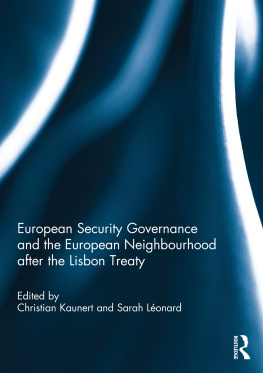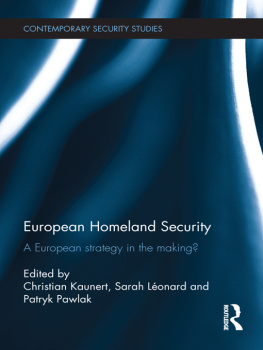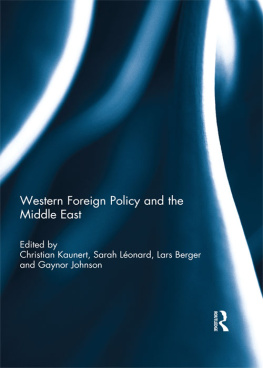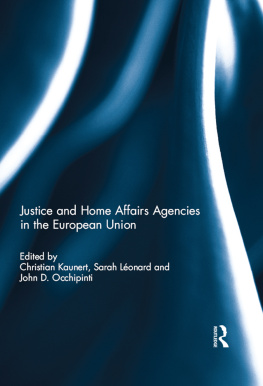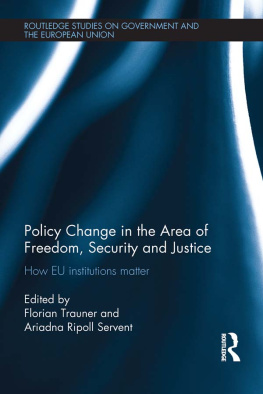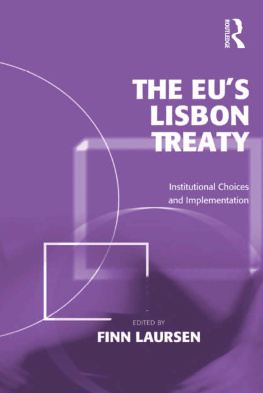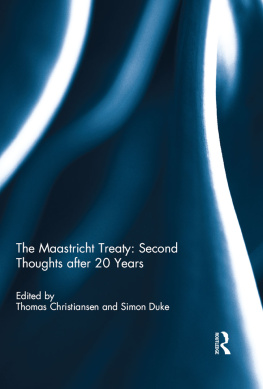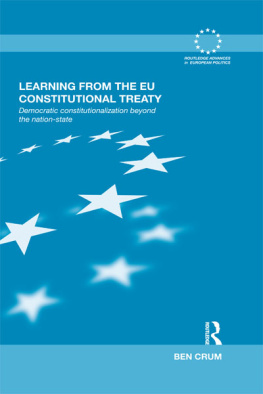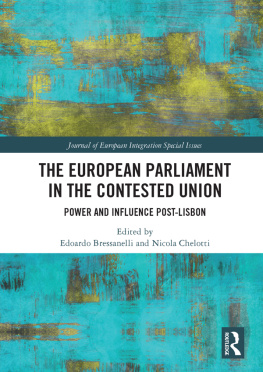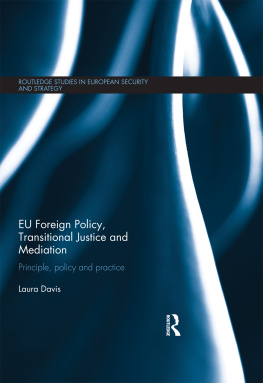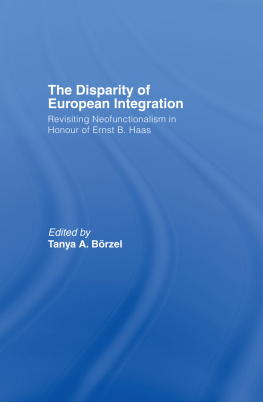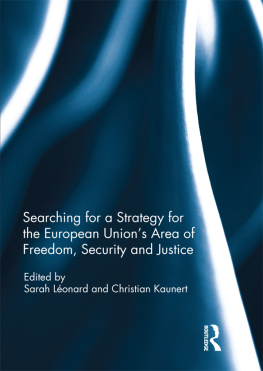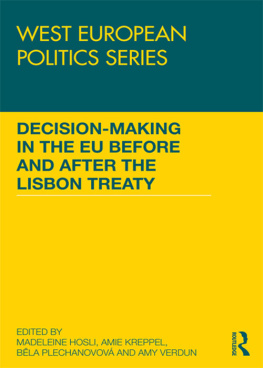
Developing European Internal Security Policy
The European Union (EU) is making strong inroads into areas of security traditionally reserved to states, especially into internal security, or Justice and Home Affairs. The Area of Freedom, Security and Justice (AFSJ), as it has been renamed in the Amsterdam Treaty, has seen significant policy developments since the late 1990s. In fact, there has been no other example of a policy-making area making its way so quickly and comprehensively to the centre of the treaties and to the top of the EUs policy-making agenda. After major treaty revisions in Maastricht, Amsterdam, Nice, and, finally the Lisbon Treaty, which entered into force on 1 December 2009, as well as an increased political impetus through the European Council Summits in Tampere (1999), the Hague (2004), and Stockholm (2009), the area appears as one of the most promising policy fields for integration in the EU in the foreseeable future. This process has deepened even more significantly after the terrorist attacks on 11 September 2001 in the United States, on 11 March 2004 in Madrid, and on 7 July 2005 in London.
This book is the first to analyse these hugely topical developments in European internal security at both the treaty and policy levels, as well as its implementation at the national level, from various disciplinary perspectives (political science, law, criminology, etc).
This book was previously published as a special issue of European Security.
Christian Kaunert is Senior Lecturer in EU Politics and International Relations at the University of Salford, UK and Marie Curie (Senior) Research Fellow at the European University Institute Florence, Italy.
Sarah Lonard is Lecturer in International Security at the University of Salford, UK and Marie Curie Research Fellow at Sciences Po Paris, France.
Developing European Internal Security Policy
After the Stockholm Summit and the Lisbon Treaty
Edited by
Christian Kaunert and Sarah Lonard
First published 2012
by Routledge
2 Park Square, Milton Park, Abingdon, Oxon, OX14 4RN
Simultaneously published in the USA and Canada
by Routledge
711 Third Avenue, New York, NY 10017
Routledge is an imprint of the Taylor & Francis Group, an informa business
2012 Taylor & Francis
This book is a reproduction of European Security, vol. 19, issue 2. The Publisher requests to those authors who may be citing this book to state, also, the bibliographical details of the special issue on which the book was based.
All rights reserved. No part of this book may be reprinted or reproduced or utilised in any form or by any electronic, mechanical, or other means, now known or hereafter invented, including photocopying and recording, or in any information storage or retrieval system, without permission in writing from the publishers.
Trademark notice: Product or corporate names may be trademarks or registered trademarks, and are used only for identification and explanation without intent to infringe.
British Library Cataloguing in Publication Data
A catalogue record for this book is available from the British Library
ISBN13: 978-0-415-68882-6
Typeset in Times New Roman
by Taylor & Francis Books
Disclaimer
The publisher would like to make readers aware that the chapters in this book are referred to as articles as they had been in the special issue. The publisher accepts responsibility for any inconsistencies that may have arisen in the course of preparing this volume for print.
Contents
Christian Kaunert and Sarah Lonard
Dora Kostakopoulou
Christian Kaunert
Ariadna Ripoll Servent
Eiko Thielemann and Nadine El-Enany
Sarah Lonard
Vihar Georgiev
Christian Kaunert and Marina Della Giovanna
Javier Argomaniz
Alexandra Schwell
After the Stockholm programme: an area of freedom, security and justice in the European Union?
The European Union (EU) is making strong inroads into areas of security traditionally reserved to states, especially into internal security, or Justice and Home Affairs(JHA). The area of freedom, security and justice (AFSJ), as it has been renamed in the Amsterdam Treaty, has seen significant policy developments since the late 1990s (Kaunert 2005, 2007, 2009, 2010a, 2010b, 2010c). Monar (1999) underlines the fact that there has been no other example of a policy-making area making its way so quickly and comprehensively to the centre of the treaties and to the top of the EUs policy-making agenda. After major treaty revisions in Maastricht, Amsterdam, Nice, and, finally the Lisbon Treaty, which entered into force on 1 December 2009, as well as an increased political impetus through the European Council Summits in Tampere (1999), the Hague (2004) and Stockholm (2009), the area appears as one of the most promising policy fields for integration in the EU in the foreseeable future. This process has deepened even more significantly after the terrorist attacks on 11 September 2001 in the United States, on 11 March 2004 in Madrid and on 7 July 2005 in London. Some scholars have even suggested that these empirical developments, and the resulting increasing involvement of the EU in internal security matters, have changed EU governance more generally. This special issue explores these significant developments in the AFSJ at both the treaty and policy levels, as well as its implementation at the national level, from various disciplinary perspectives.
The EUSIM project and the conference on internal security policies in the EU after the Stockholm programme: an area of freedom, security and justice(AFSJ) in the EU?
This special issue is derived from a conference on the AFSJ that took place at the University of Salford, Centre for European Security, on 2829 January 2010. This conference is part of the EUSIM project, which is generously funded by the European Commission under the Jean Monnet programme/Lifelong Learning programme in 200912. Many thanks are therefore due to the European Commission for this important financial support, without which the organisation of this conference would not have been possible. The main aim of the EUSIM project is to bring the study and research of the EU closer to students of a wide variety of backgrounds. Popular discourse in Britain often depicts the EU as an undemocratic and bureaucratic monster imposing its will upon the unwilling and sovereignty-less Member States. Consequently, students are often thought to be ideologically opposed to, or, at the very minimum, not interested in studying and researching the EU. This project aims to change this perception. It does so through the application of a problem-based learning (PBL) approach to the European Union Simulation Jean Monnet module, which aims to support students in becoming independent, enterprising problem-solvers, through the examination of real-life EU policy problems. In addition to more traditional classes that introduce students to policy-making in the EU, students are given a policy scenario and negotiate in weekly sessions akin to Council meetings, before the culmination of the negotiations at a session modelled upon a European Council Summit. The scenario in 2009/10 was on the theme of the AFSJ, and all students were given free access to the latest cutting-edge research on their research topic by attending the conference and will gain further insights through the publication of this special issue. Bringing together students, researchers and practitioners considerably enhances the understanding and the enthusiasm of students who would normally not come into contact with the EU. The interaction between students, researchers and policy-makers has been of tremendous benefit to all involved.


